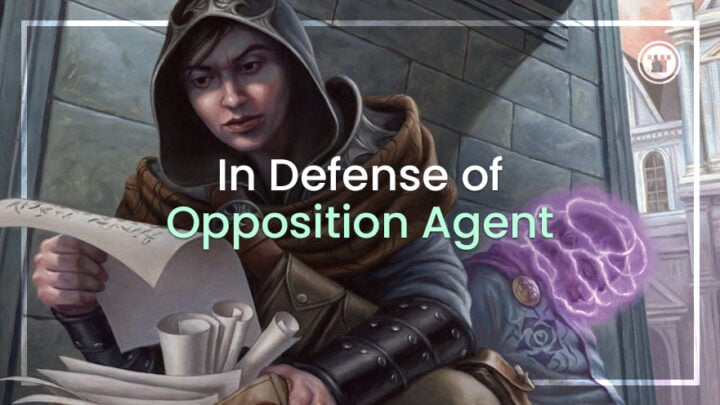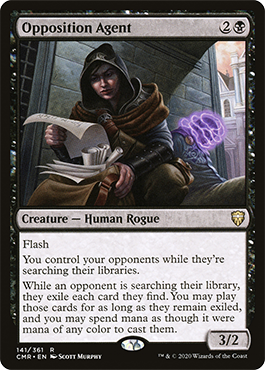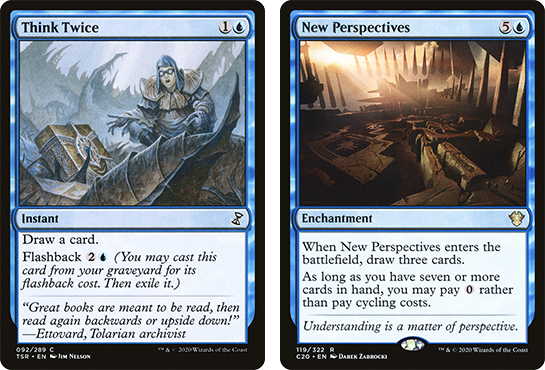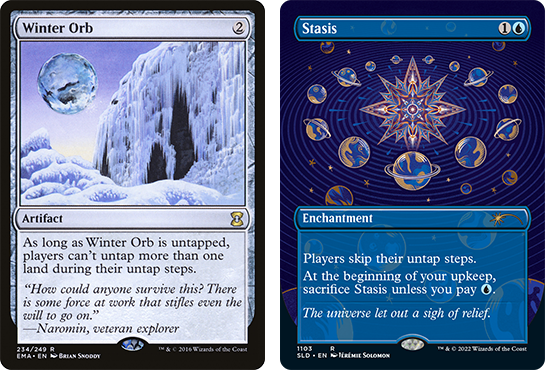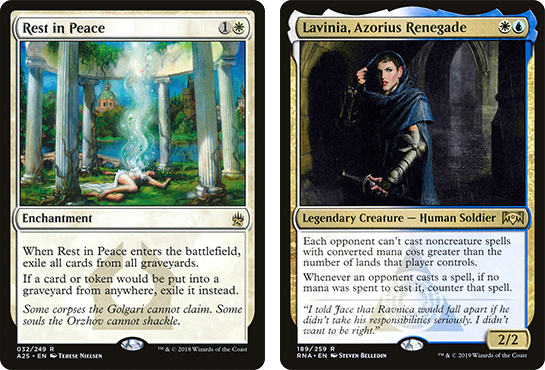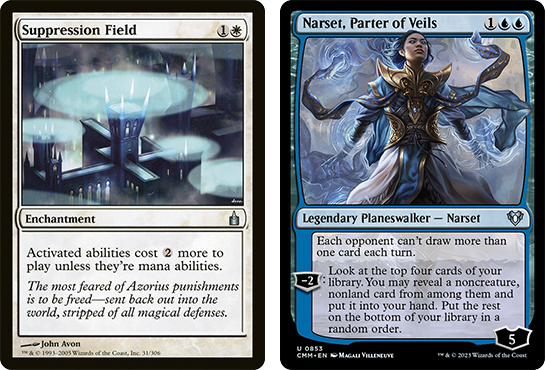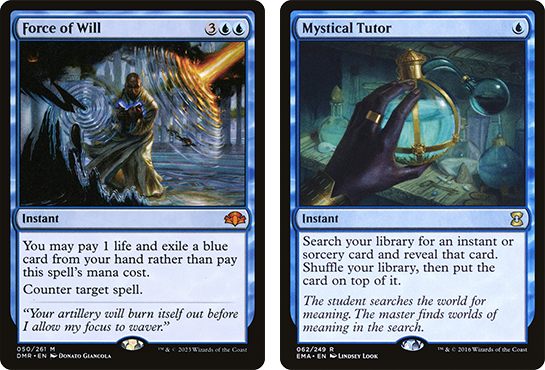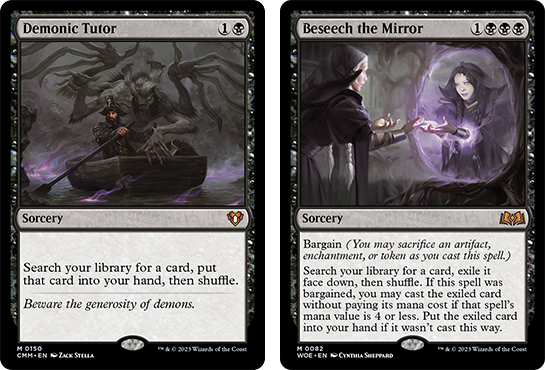Sometimes it’s hard to understand why specific Magic cards come to be especially disliked by the player base – but with Opposition Agent, it seems pretty obvious.
Few other cards boast the potential to generate such crushing blowouts at instant speed, while also sticking around long-term as a disruptive hatebear. It attacks decks on an angle too broad to solve with deckbuilding and too unique to justify playing around unless you specifically know it’s there. Even the actual mechanics of the card can come off as unusually humiliating compared to the ways we’re used to enemy cards hurting us.
But while the hate for Opposition Agent may be understandable, I’m not so sure it’s actually deserved. What if this card has just been misunderstood all along? Can we flip our logic a little and understand this effect as one which actually improves the play experience for everybody at the table?
The Opposite of Fun
Designing and evaluating cards for Commander is very different to any other Magic format. Not just because of rules differences or the altered dynamic of multiplayer, but because of the expectation that a card be fun for everyone at the table – not just the player who casts it.
That elite category of “cards you don’t mind losing to” will obviously vary from playgroup to playgroup – even within the same group from day to day. But if the goal of casual Commander is something like “have your deck do cool stuff in games”, then of course there will be bias towards proactive, advantage-generating cards, and against interactive, restrictive ones – a.k.a. “Prison” or “stax” cards.
As one of the most effective and Commander-relevant such cards printed in recent years, Opposition Agent is an obvious target for those who oppose (heh) the use of these effects in casual games. Commander decks rely on search effects to overcome the inherent inconsistency of 100-card singleton rules, so the Agent feels less like an anti-combo or anti-ramp tool than just a “NO FUN ALLOWED” sign.
Also, where other prison cards like Rest in Peace or Lavinia, Azorius Renegade tend punish more powerful and degenerate strategies the hardest, Opposition Agent is arguably most crippling to budget manabases and niche, off-meta gameplans – which lack the raw power to battle through the effect and win “fairly” if it’s not removed.
Of course, even if the three affected players should usually be able to find an answer to the Agent relatively swiftly, you still can almost guarantee that it will crush that first player you flash it in against. The actual game impact of one wasted turn might not be any more severe in multiplayer than in 1v1. But considering how much happens in a single Commander turn cycle, let alone how long it can take in real time – all garnished with the sudden pang of disappointment at having your promising play spelljacked – it’s not surprising that some people would rather concede to Agent hitting the stack.
With Great Power, Comes Great Agency
I’m not here to argue that those one-sided blowouts I just described are actually great fun to have in your games. But I think it’s worth stopping to ask: is there any reason we have to use Opposition Agent in such an oppositional way?
Most powerful cards have the potential to be used in an aggressive, bullying fashion if you’re bloody-minded enough. Instead of holding counterspells to break up infinites or other lethal plays, we could simply block every time one opponent tries to cast their commander. Combat-oriented decks can pick the weakest-looking opponent at the start of the game and just swing everything their way turn after turn to try and thin their opposition quickly.
Given that we’re constantly making decisions to play cards “nicely” anyway, it’s worth considering whether we can do the same with Opposition Agent. While we may not be able to choose which opponents its effect applies to, we still have much more agency in the final outcome compared to other prison effects like Suppression Field or Narset, Parter of Veils.
The accessible cost and flash speed mean we have a lot of flexibility about when we play the Agent. Like a Force of Will, it will feel a lot less mean-spirited if we save this interaction to block a high-caliber play rather than opportunistically dropping it on the first Cultivate we see. As a 3/2 creature in black, Opposition Agent is also easy to sac, trade off or outright remove if its restriction starts getting in the way of the fun too much.
Even while it’s in play, the effect still affords us some agency over how severely to disrupt opposing lines. We can’t really help our opponents get any lands they were searching for, but in other scenarios we at least have some chance for negotiation. Imagine one opponent casts Mystical Tutor to find a counterspell for another opponent’s winning play. Even if we decide to flash in Opposition Agent at this precise moment, there’s every chance we’ll just search up and cast the same counterspell ourselves!
By choosing to deploy and resolve its signature effect more compassionately, Opposition Agent can become a balancing force in your games rather than a punishing one. Your opponent’s libraries may not always have the pieces you need to combo off yourself, but you can usually search up the right kinds of interaction to clamp down on anybody else trying to rush through a winning play.
Most Tutors Are Demonic Anyway
Opposition Agent’s deleterious effect on Commander manabases has often been exaggerated in these discussions – even if you’re maxing out on fetchlands, the singleton deckbuilding rules means that Agent is more likely to block mana ramp effects than mana fixing. I have little sympathy for players whose ramp is shut down compared to those trying to find their colors – and even less for anyone trying to resolve an actual tutor effect.
I’m actually surprised more people aren’t on Opposition Agent’s side in this struggle. The huge uptick in new cards printed over the past 5 years means it’s much more rare for decks to depend on tutoring a single, unique effect from their 99; you can almost certainly play some close equivalent effects instead.
At the same time, the overall power increase from introducing new Commander-focused cards has brought more playgroups up to the level where prison effects become more of a necessary speedbump than a total roadblock.
When I defined a new power scale for Commander decks a few years back, I focused on how many spells a deck needs to draw and play, on average, to win from any given situation. That’s a stat which matters because it defines the range where actual gameplay happens – when the deck is doing something your opponents care about, but hasn’t actually won yet.
Tutors and searching effects in general primarily serve to warp past that gameplay and produce the fastest, most consistent checkmates a deck has to offer. At least if Opposition Agent is in the metagame it builds in a real sense of risk, or else forces players to remove that obstacle before they skip to the finish line.
Opposition Is Not The Enemy
Opposition Agent will always get people’s salt levels up, because it’s designed as a “gotcha” card and we’re biased towards remembering that kind of emotional wound. But it’s only as rude a card as we choose to make it, and given the surprising level of agency it allows in how its effects resolve, there’s plenty of potential to make this Agent the Opposition of evil at your table.
If you find yourself dissatisfied at the creeping power level of casual Commander, or you just want more ways for non-blue decks to challenge stack-based combo, restrictive prison effects like this must inevitably become an accepted part of your arsenal. These are the tools we are given to fight back – and with the odds more balanced, the game is more interesting even for those to whom the Agent is most opposed. Embrace a bit of healthy Opposition today!

Tom’s fate was sealed in 7th grade when his friend lent him a pile of commons to play Magic. He quickly picked up Boros and Orzhov decks in Ravnica block and has remained a staunch white magician ever since. A fan of all Constructed formats, he enjoys studying the history of the tournament meta. He specializes in midrange decks, especially Death & Taxes and Martyr Proc. One day, he swears he will win an MCQ with Evershrike. Ask him how at @AWanderingBard, or watch him stream Magic at twitch.tv/TheWanderingBard.

